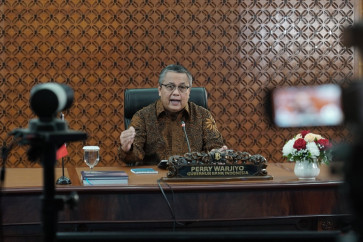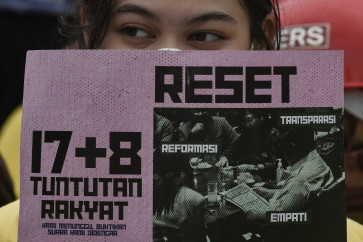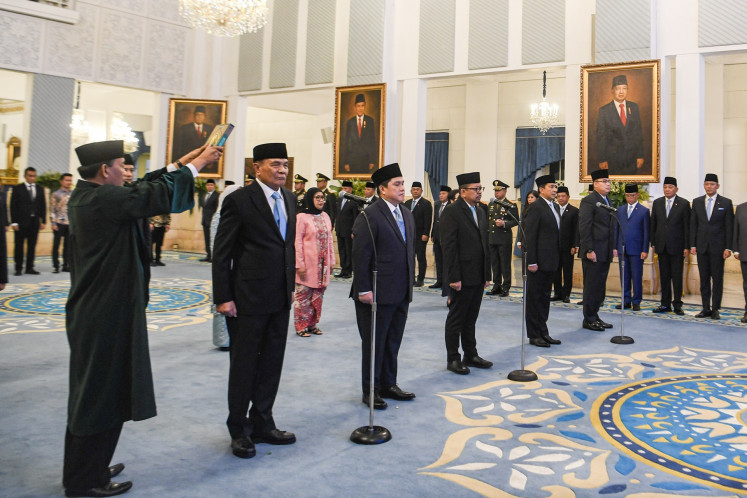Popular Reads
Top Results
Can't find what you're looking for?
View all search resultsPopular Reads
Top Results
Can't find what you're looking for?
View all search resultsA decade of regional cooperation to fight illegal logging
Green economy
Change text size
Gift Premium Articles
to Anyone
G
reen economy. Green products. Green solutions.
These are but a few of the phrases that get tossed around with increased regularity as marketers seek to associate their products and their causes with the environment.
But in the environmental context, green really means one thing: forests. Forests have come to stand as a near-universal symbol for nature and the environmental movement. They even speak to the increasing percentage of the global population that lives in cities, who are far more dependent on forests than they perhaps realize.
This connection — between people and forests — underpins the second Asia Pacific Forestry Week taking place from Nov. 7-11 in Beijing (and is also the theme of the 2011 UN-declared International Year of Forests).
Roughly 1,000 people — ranging from government officials, corporate executives, academics and civil society representatives — from 50 countries have descended on the Chinese capital to take part in a candid exchange on recent developments in all aspects of forest policy and practice.
Given that most of the world’s few remaining patches of natural forest are under pressure from growing demands on the planet’s resources, advancing responsible forestry and trade (while at the same time reducing carbon dioxide emissions from deforestation) is one of the critically important tasks being discussed.
Because timber markets have traditionally not distinguished between legal or illegally sourced timber, international trade has inadvertently acted as a driver of deforestation.
The trans-boundary nature of the issue has led many countries to engage in both bilateral and multilateral negotiations; such as the Voluntary Partnership Agreement — or VPA — agreed between Indonesia and the European Union in May 2011, and several memoranda of understanding with key wood products trading partners.
Ten years have passed since the Bali Declaration on Forest Law Enforcement and Governance signed in 2001.
This landmark initiative brought Asian wood producing, processing and consuming countries together to lay the foundation for concerted efforts in combating illegal activities in the forestry sector.
Forestry ministers openly acknowledged the problem of illegal logging for the first time and agreed to a series of steps to begin work to stop it. Since then, many countries and international agencies have taken concrete actions to curb illegal logging, ranging from on-the-ground activities to policies and regulations.
As a direct and indirect result of this commitment, some encouraging signs have emerged. A 2010
report by Chatham House estimates that 17 million hectares of tropical forest have been protected from degradation, and at least 1.2 billion tons of carbon emissions reduced over the last decade.
In Indonesia, logging illegally in excess of licensed harvests declined by 75 percent. In spite of these important achievements however, deforestation and degradation continue at an alarming rate.
There have been global and regional measures taken to improve forest management, promote the legal trade in timber products, encourage ecologically based reforestation, and link these actions to the emerging discussion around the role that forests play in mitigating global climate change.
As we approach the end of the Year of Forests, it is important for us all to take a moment to remember what forests do for us and why they trigger such a strong emotional response.
Because forests are not only beautiful objects. They provide habitat for endangered and endemic species of plants and animals; they regulate the flows of freshwater that we rely on for agricultural, industrial and consumption purposes; they provide food and shelter for forest-dependent communities and commodities — from furniture to floor boards — for the rest of us; and, as is increasingly recognized, they play a vitally important role in managing our climate through their ability to breathe in carbon dioxide and exhale oxygen.
These multiple values of forests will take on increasing importance as the global population edges ever upward from seven billion today to nine billion people by 2042. Much of that growth will come in developing countries.
With this comes a marked increase in demand for food and fuel, putting additional pressures on
forestland.
So, whether you live in Bali, Beijing, Bangkok, Berlin, or Boston, forests play a crucial role in your life. And you can rest assured that this week there were at least 1,000 people in one of the most populous city on Earth working to keep them green.
Jack Hurd is chief of party for the Responsible Asia Forestry & Trade Program in Thailand and Wahjudi Wardojo is senior advisor on international forest carbon policy for The Nature Conservancy in Indonesia.










